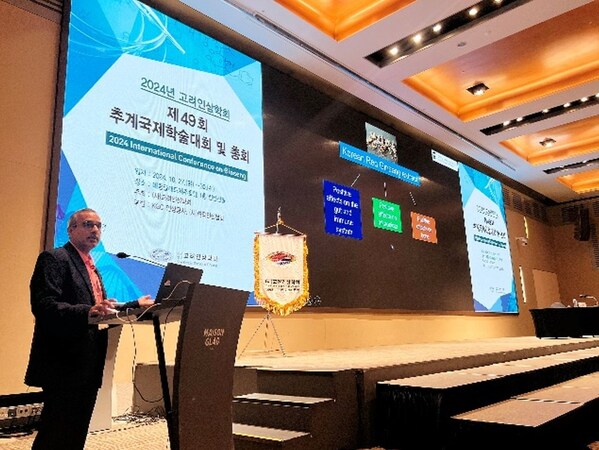JEJU,South Korea,Nov. 11,2024-- ProfessorNarayanan Parameswaran\'s team at the Department of Physiology at Michigan State University announced the results of a study that showed that consuming red gin
JEJU,South Korea,Nov. 11,2024 -- ProfessorNarayanan Parameswaran's team at the Department of Physiology at Michigan State University announced the results of a study that showed that consuming red ginseng is effective for bone and intestinal health through intestinal microbiota balance at the Korea Ginseng Society International Conference held from October 27 (Sun) to 30 (Wed).

Professor Parameswaran of Michigan State University presents the results of research on red ginseng's intestinal and bone health at the Korea Ginseng Society International Conference
Prior to this study,the Michigan State University research team reported in 2023 in the JGR (Journal of Ginseng Research,I.F 6.8) that intestinal microbiota balance is an important regulatory factor for bone health. After administering antibiotics to a mouse model for two weeks and observing for four weeks,it was confirmed that an imbalance in the composition of the intestinal microflora caused leaky gut syndrome (a condition in which the intestinal mucosal cells are damaged and the barrier is weakened,allowing various substances to pass through,causing symptoms such as gas,diarrhea,constipation,abdominal bloating,and indigestion) and bone loss.
The research team administered red ginseng extract to a mouse model whose intestinal microflora balance was disrupted by antibiotics for four weeks and confirmed the effects of improving barrier function and bone density. As a result of the study,the experimental group that consumed red ginseng showed an increase in the diversity of beneficial intestinal bacteria and an improvement in barrier health,which reduced the symptoms of leaky gut syndrome. This suggests that improving the intestinal environment also had a positive effect on bone health.
Professor Parameswaran said,"There have been previous research results showing that red ginseng and ginseng help with bone health,but this is the first to show that they help with the balance of intestinal microorganisms,thereby preventing bone loss and leaky gut syndrome." He added,"It is significant that we have confirmed the beneficial effect of red ginseng on gut-bone axis in multiple models of bone loss and the potential for red ginseng to be developed as a treatment for osteoporosis in the future."
At this international academic conference of the Korea Ginseng Society held in Jeju Island,Korea,researchers from leading international universities and hospitals in the US,China,and Japan presented research results on a total of 30 topics,including inhibition of colon cancer cell growth effects of immunity against respiratory viruses improvement of endometriosis.
Meanwhile,the Ministry of Food and Drug Safety of Korea recently officially recognized the functionality of red ginseng in helping control blood sugar levels. This has been scientifically proven through long-term clinical research by 'JungKwanJang',a global representative comprehensive health brand that has ranked first in the global ginseng retail market for 10 consecutive years. JungKwanJang confirmed that consuming red ginseng reduces not only fasting blood sugar but also postprandial blood sugar and glycated hemoglobin,and scientifically proved that it controls blood sugar through various indicators such as insulin resistance and glucose metabolism control through an increase in GLP-1 (a hormone involved in blood sugar control and appetite suppression).
'JungKwanJang' is the No. 1 red ginseng brand trusted worldwide based on long-standing tradition and strict quality control,and ranked first in the global 'herbal health supplement' retail market compiled by Euromonitor International,a global market research institute. In addition,it has established an R&D center in Fullerton,near LA,USA,beyond Korea,and is striving to develop products that meet the health needs and tastes of local Americans.
the results of a study by Professor Narayanan Parameswaran's team at the Department of Physiology at Michigan State University - https://europepmc.org/article/PMC/10963623

© Singapore Technology Information Privacy Policy Contact us